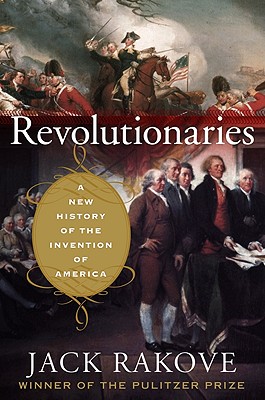 nited States and its territories. Thus began the era of Prohibition, a nearly 14-year orgy of lawbreaking unparalleled in our history." Okrent
nited States and its territories. Thus began the era of Prohibition, a nearly 14-year orgy of lawbreaking unparalleled in our history." Okrentviews Prohibition as one skirmish in a larger war waged by small-town white Protestants who felt besieged by the forces of change then sweeping their nation - a theory first proposed by the historian Richard Hofstadter more than five decades ago. Though much has been written about Prohibition since then, Okrent offers a remarkably original account, showing how its proponents combined the nativist fears of many Americans with legitimate concerns about the evils of alcohol to mold a movement powerful enough to amend the United States Constitution.The rest is here.
"Refreshingly accessible and deeply informed," Revolutionaries: A New History of the Invention of America by Jack Rakove "is just what you need when someone on the Internet or cable TV offers to give you the ideas about history now being offered by the Tea Party movement in exchange for those you got from well-trained teachers," David Hollinger writes in the San Francisco Chronicle. (The internet and well-trained teachers are, of course,
 not in separate worlds.) Hollinger continues:
not in separate worlds.) Hollinger continues:The Federalist Papers an argument against a strong federal government that undercuts the policies of the Obama administration? Tea Party leader Dick Armey of Texas made this claim recently. When a skeptical reporter asked him about Alexander Hamilton, the chief author of the Federalist Papers, Armey declared that only "ill-informed professors" thought Hamilton was an advocate of a powerful national state. Ah, yes, professors.Continue reading here.
"Revolutionaries" is written by a distinguished professor at Stanford who, unlike Dick Armey, knows the difference between a federalist and an anti-federalist....
But "Revolutionaries" is much more than a convenient inventory of truths by which the Tea Party version of the founding can be refuted. While Rakove does provide us with a cogent summary of what scholars know about the political history of the late 18th century, what gives his book real distinction is the skill with which he delivers this knowledge through a series of interlocking biographical narratives.
"How authentic can a war be when things don't blow up?" asks Jeff Stein in a Washin
 gton Post review of CYBER WAR: The Next Threat to National Security and What to Do About It by Richard A. Clarke and Robert K. Knake. "But the utility of cyber-tools in service of old-fashioned firepower ha[s] already been made clear." Nevertheless, "U.S. presidents have treated cyber-defense like spinach, picking it up and then putting it down....It will probably take 'an electronic Pearl Harbor' to wake us up, Clarke says."
gton Post review of CYBER WAR: The Next Threat to National Security and What to Do About It by Richard A. Clarke and Robert K. Knake. "But the utility of cyber-tools in service of old-fashioned firepower ha[s] already been made clear." Nevertheless, "U.S. presidents have treated cyber-defense like spinach, picking it up and then putting it down....It will probably take 'an electronic Pearl Harbor' to wake us up, Clarke says."Also reviewed this week: At the Edge of the Precipice: Henry Clay and the Compromise that Saved the Union by Robert V. Remini is discussed in The New Republic. The New York Times takes up THE BEAUTY BIAS: The Injustice of Appearance in Life and Law by Deborah L. Rhode, MAKING HASTE FROM BABYLON: The Mayflower Pilgrims and Their World: A New History by Nick Bunker, and THE LAST HERO: A Life of Henry Aaron by Howard Bryant.